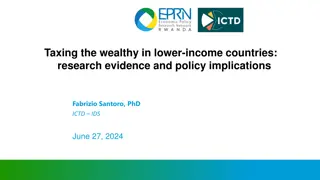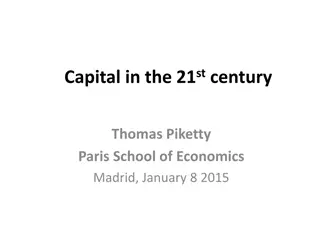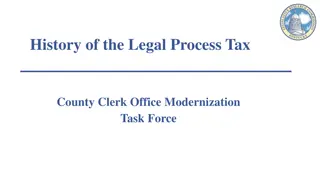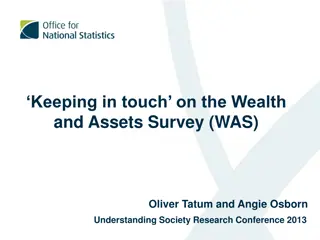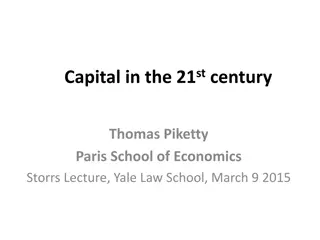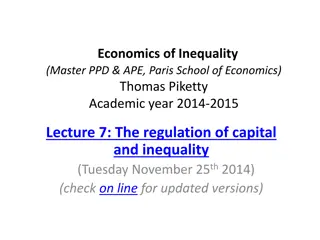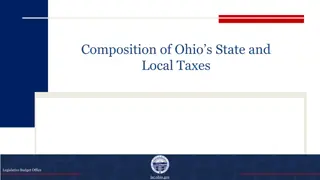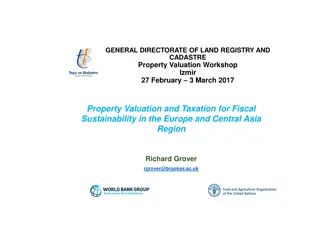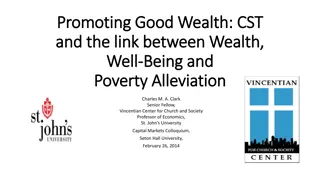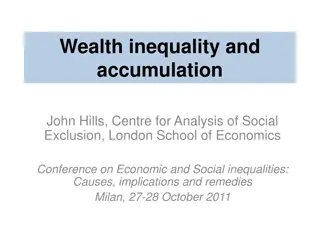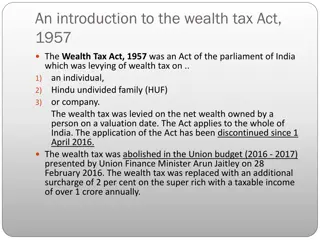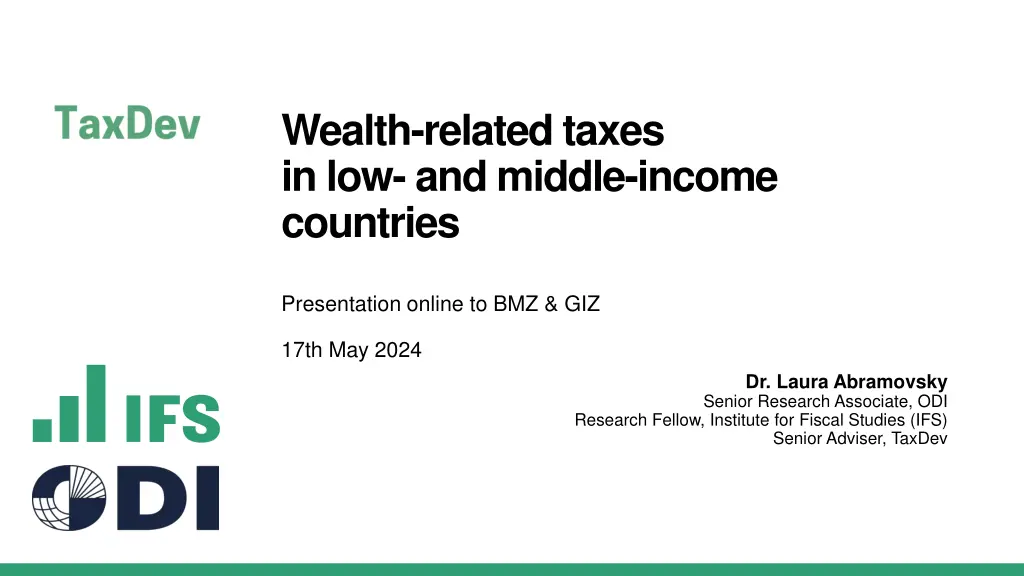
Wealth-Related Taxes in Low and Middle-Income Countries: Insights & Challenges
Explore the complexities of wealth-related taxes in the context of income and wealth inequality, along with practical considerations for taxing net wealth. This presentation delves into defining and measuring wealth, prevalence of wealth-related taxes, and the rationale for taxing net wealth. Gain insights on the challenges of measuring wealth and the various assets that contribute to individual or household wealth in different tax systems.
Download Presentation

Please find below an Image/Link to download the presentation.
The content on the website is provided AS IS for your information and personal use only. It may not be sold, licensed, or shared on other websites without obtaining consent from the author. If you encounter any issues during the download, it is possible that the publisher has removed the file from their server.
You are allowed to download the files provided on this website for personal or commercial use, subject to the condition that they are used lawfully. All files are the property of their respective owners.
The content on the website is provided AS IS for your information and personal use only. It may not be sold, licensed, or shared on other websites without obtaining consent from the author.
E N D
Presentation Transcript
Wealth-related taxes in low- and middle-income countries Presentation online to BMZ & GIZ 17th May 2024 Dr. Laura Abramovsky Senior Research Associate, ODI Research Fellow, Institute for Fiscal Studies (IFS) Senior Adviser, TaxDev
Introduction Address high levels of income & wealth inequality + collect more revenues in fairer ways: Top policy priority: national gov t, international initiatives & GDC Recent estimates: wealthiest pay too little income tax (% of their income) << those at the bottom of the distribution of income Hide their income and wealth from authorities Exploit loopholes due to bad policy design & implementation // lack of international cooperation. Increasing calls for taxes on net wealth Several national and international proposals and reforms Global minimum tax on super rich being advocated by G20 Presidency & EU Tax Observatory. This presentation: Deep dive on taxes on the stock of wealth in the context of wide national tax systems Consider wealth-related taxes more broadly: capital income tax & inheritance tax
The presentation is structured as follows: Defining and measuring wealth Wealth-related taxes Prevalence of wealth-related taxes in bilateral partners of GDC Rationale for taxing net wealth Taxing net wealth: design and practical consideration Main takeaways
Defining wealth We consider private wealth held by individuals (or households) in the form of different assets: Movable physical assets (cars, boats, artwork) Immovable property (buildings, main residence, land) Private pensions Other financial assets (such as government bonds, company shares & cash) Often wealth is calculated as the net value of assets For example, value of main residence minus value of mortgage or the value of financial assets minus other debts
Measuring wealth is challenging Hidden assets (e.g. offshore) and underreported value More prevalent among wealthy individuals Affects measures of inequality Valuation varies across different assets Trickier for holdings in family businesses, some immovable property and movable property (such as artwork) Easier for shares in listed companies and government bonds or cash held in bank accounts Imperfect data sources on assets, asset values and assets ownership, and wealth distribution Administrative data from wealth-related taxes Wealth surveys and other household surveys List of rich people Scarcer in LMICs Sometimes conflicting estimates for the same country (e.g. Carranza et al, 2023 LAC)
Some facts on wealth levels and distribution Private wealth has increased faster than income & is many factors larger (OECD, 2021, Chancel et al, 2022) Wealth concentration >> income concentration (Ibid) Level of wealth inequality and trends vary across countries across inequality measures & sources Downloaded from wid.world
Wealth: sources, uses and composition Wealth sources Earnings, gifts and inheritances, returns to existing wealth (normal and above normal) Returns: dividends, interests, rental income, capital gains, business profits Wealth uses Consumption, invest, transfer (gift and inheritances) Variation in sources, uses and asset composition across individuals over the wealth distribution beyond lifecycle
Wealth-related taxes: 3 different types Capital income taxes (returns to wealth): interest income, dividends, royalties, rental income from immovable and movable property as well as capital gains (i.e. on the increase in the value of an asset between its purchase and when it is disposed of). Taxes on the transfers of wealth: estate taxes (imposed on the value of the donor s total net wealth at the time of death) inheritance taxes (imposed on the value of the assets the beneficiary receives from the deceased donor), gift taxes (imposed on the value of the assets the beneficiary receives from a live donor), taxes on market exchange of assets, from financial assets and bank transfers to real property. Taxes on the stock of wealth: broad or net wealth taxes ( wealth taxes ) imposed on the value of most or all types of assets held by an individual minus the related debts; taxes on the ownership of immovable property (often referred to property taxes or real estate), and taxes on the ownership of movable property (from cars and aircrafts to financial assets).
Prevalence of wealth-related taxes in bilateral partners of German Development Cooperation No. partners (total 38) Tax Type % partners Capital income tax Capital gains 36 95% Taxes on wealth transfers Estate, inheritance or gift taxes Other transfer / stamp tax 8 21% 97% 37 Taxes on the stock of wealth Wealth tax Taxes on immovable property 8% 95% 3 36
3 Partners with broad permanent taxes on wealth Tax-Free Allowance (Approx. US$ equivalent, as at Nov 2023) Country Rate Structure Taxable Person Assets Taxed Individuals: worldwide assets of residents; assets in Algeria for non-residents Net wealth values of various assets e.g. real estate, vehicles, boats, aircraft, art, racehorses Net asset value e.g. real estate, personal property, luxury goods, financial holdings and owned intellectual property, cash, and other tangible and intangible assets, less outstanding liabilities. Net wealth = various assets e.g. real estate, yachts, boats, art, aircraft or mining or oil rights (other than shares, accounts receivables, portfolio investments, and/or financial leasing contracts with entities or persons resident in Colombia). 0.15% to 1% US$ 0.73 million Algeria Individuals: worldwide assets of residents; assets in Bolivia for non-residents 1.4% to 2.4% US$ 4.3 million Bolivia Individuals: worldwide assets of residents; assets in Colombia for non-residents; and foreign entities with assets located in Colombia 0.5% to 1.5% until 2026; 0- 5% to 1% 2027 onwards US$ 0.75 million Colombia Bangladesh: surcharge rate for PIT based on wealth // Ecuador: one-off wealth tax repeatedly
Taxing the stock of wealth? Objective is to raise revenues in a fair way & lower inequality in income and wealth through tax and benefit system Wealthy and super-rich pay too little income taxes Use net wealth tax? Broader consensus: Improving progressivity and effectiveness of taxes imposed on capital income and wealth transfers may be desirable to increase fairness of tax system & social contract Lack of consensus: Whether a well-designed national tax system should include recurrent taxes on net wealth Better to tax wealth through capital income taxes & inheritances taxes? Net wealth taxes: Distorts behaviour more? Migration, saving and investing, evasion, other. More costly to administer and comply with?
Taxing wealth sources & uses more efficient + equitable? Higher wealth can come from different sources: Higher earnings and saving for future consumption - tax progressively earnings if returns on savings same for all (though often they are not) Higher returns to capital due to luck, skill, effort or some other advantage - tax excess returns without taxing the normal return that just compensates for delaying consumption wealth tax does the opposite Inheritances and gifts tax these by a well-designed inheritance tax Taxing sources of wealth directly Tax those with higher lifetime resources more accurately without penalising saving Same applies to taxing all uses of wealth (consumption, transferring wealth) Taxing the stock of wealth taxing less heavily higher returns to capital Less equitable and efficient than taxes on capital income Need to consider interaction with other taxes when choosing design and implementation Interrelated revenue, efficiency & equity impacts
Net wealth tax as complementary tool? Too high levels of wealth concentration today - harmful for society Wealth may confer other benefits beyond (delayed) consumption: political power, undermine democracy Environmental damage caused mainly by the super-rich? They should pay more Use other instruments in a toolkit? E.g. Regulate markets & empower workers to reduce concentration pre-tax Still could use wealth tax could remediate previous mistakes Taxes on income and wealth transfers imperfect: wealthy pay none or too little tax Equity and efficiency properties of all wealth-related taxes can be eroded by policy choices that result in arbitrary exemptions and loopholes Evasion and avoidance and other behavioral responses Tax net wealth to complement & diversify revenue sources But more complexity & costs of taxing more bases Not clear taxing stock of wealth is easier to administer than other wealth-related taxes
Net wealth taxes: emerging evidence on behavioural impacts Nascent and sometimes conflicting evidence Most from the few countries that have a net wealth tax & good individual data HICs (Scandinavia, Switzerland, Spain) not much from L&MICs May reduce taxable wealth Taxpayers may change their real (e.g. savings or migration) or reporting behaviour Large evasion and avoidance responses Driven by design loopholes, implementation decisions and reliance on self-reporting of assets to the tax authorities Introduction of third-party reporting on specific assets assets revealed. Design broad base taxes that include all assets and minimum evasion/avoidance opportunities Migration effects Intranational migration when rates vary across states Small impact of increasing rates on outflows of top 2%, but modest aggregate impact on the economy
Net wealth taxes? Not obvious answer, further considerations All in all, better to tax comprehensively and progressively capital income, including capital gains, and lifetime inheritance flows than taxing net wealth. Improve design & implementation of capital income taxes Consider effective inheritance taxes International tax cooperation improve CIT performance & taxation of wealthy that are more mobile, close loopholes Increasing consensus on complementary net wealth taxes targeting the super-rich Either at the national level or as part of global minimum tax, Ensure that these individuals that pay virtually no income tax pay their fair share in taxes. Net wealth taxes in the context of the whole tax (and benefit) system Interaction with other taxes in achieving policy objectives in the most efficient, equitable and cost- effective way Not as a substitute for capital income taxes How revenue is spent matters
Taxing the stock of wealth: design and practical considerations Many aspects to consider and quantitative analysis to conduct: who is taxed (unit of taxation) pros and cons of individuals vs household what is taxed (the type of assets included in the tax base) broad to avoid changes in holdings valuation issues complex and varying across assets, but improving technology the threshold and the rate structure high threshold & progressive rate structure, context specific how liquidity constraints for those asset-rich and income-poor may play out, whether it is a tax at the national or local government level, administrative capacity and taxpayers compliance and related costs Third-party information and international & intranational coordination and collaboration Admin & Compliance costs also depend on underlying distribution of wealth & design of tax economic behaviour in response to such a tax need more evidence All these would determine efficiency, equity and revenue impact of such a tax.
Taxing the stock of wealth? Ambiguous answer Ambiguous answer to the question of whether L&MICs should tax net wealth (in addition to or in place of taxing capital income). Country context is key but little information about distribution, level and composition of wealth and how (high-income) taxpayers respond to taxes in L&MICs. There is ample room to improve existing capital income taxes in L&MICs valuable even for countries with little revenue potential from this tax base in short run Key priority to develop data infrastructure, analytical capacity at both admin and MoF levels and administrative capacities Enforcement capacity, exchange of information & other third-party reporting Adequate legal frameworks Ability to effectively participate in international tax cooperation, including contributing to and using a global asset registry



